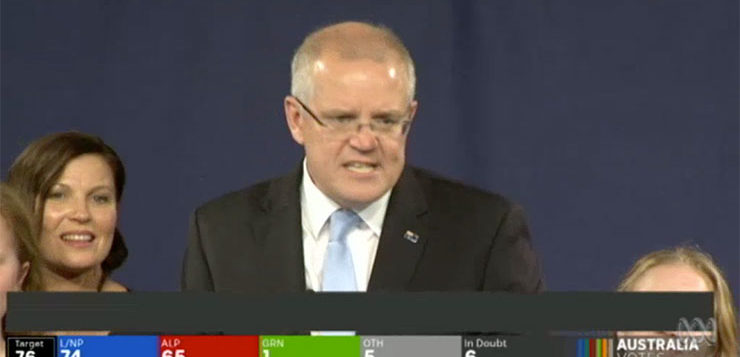DON’T MISS ANYTHING! ONE CLICK TO GET NEW MATILDA DELIVERED DIRECT TO YOUR INBOX, FREE!
We need to keep religion out of politics, and defeatism out of political loss. Carl Rhodes takes up the story.
In 1922 German political theorist Carl Schmitt declared “all significant concepts of the modern theory of the state are secularized theological concepts”. What he meant was that systems of Western political thought were grounded in the idea of the political leader being analogous to a patriarchal god.
By Schmitt’s reasoning, the idea of an omnipotent God is bequeathed to the law maker, with the political miracle being equated with the ability to rise above the laws in a state of exception.
The headline in The Australian on 20 May announcing newly elected Prime Minister Scott Morrison to be the ‘Messiah from the Shire’ paid testament to Schmitt’s almost 100-year-old proclamation.
ScoMo’s Promised Land
According to The Australian, the Promised Land that ScoMo will deliver us to is one where he will ‘demand’ that Parliament pass his plan for $158m in income tax cuts. That’s right, Morrison’s heaven is located in Australia’s back pocket and no pesky democratic process is going to stop him in achieving his mission.
These religious terms have little to do with the energetic sermonising of Morrison’s Pentecostal Church and more to do with the future of Australian democracy. Just a week before Morrison’s victory, Labor opposition leader Bill Shorten had stated his own political conviction that:
“I’m not going to be a messiah. Don’t believe in the ‘authoritarian strong man’ that I’ll do this and everyone will follow.”
If The Australian is anything to go by Shorten got it sorely wrong. Australian’s do want a strong patriarch who can offer economic redemption, and they got it in Scott Morrison.
Politics of the Sovereign
Messianism, and theology more generally, was at the centre of the election and its coverage in the press. When Morrison won it was declared as a political miracle. Meanwhile The Australian calls his followers the ‘liberal faithful’ whose response to his victory is rapturously ‘ecstatic’.
It would be easy to put all of this down as being another example of colourful political language, but there is much more going on than that. The religious terminology that is being used to describe Morrison is that of the sovereign: the ultimate power who has God’s imprimatur to rule without recourse to the laws of man.
When it is declared, for example, that “with a ‘miracle’ election result, Scott Morrison has the mandate to do whatever he likes” we are entering into a discourse that places political power above democratic process.
That Carl Schmitt, a defender of Adolf Hitler, would use his political theology to justify sovereign authority and dictatorship is a matter of historical record. What is surprising is that his ideas are echoing in 21st century Australian politics.
A Mandate to Rule
The more contemporary French political theorist, Chantal Mouffe can help understand this. As Mouffe explains the idea of the political leader as sovereign rests of the idea political authority must be based entirely on a single and incontrovertible mandate.
So when a campaigning Morrison was asked “who will have the upper hand in driving Liberal Party policy if you’re re-elected?”, he responded singularly: “I will”. There was no hint here of democratic engagement, or stakeholder consultation; just the power of the one man in charge.
It is against this form of sovereignty that Mouffe valorises democracy as a political system that does not need to be reduced to a singular mandate. Such politics is not about the achievement of sovereign power, but about the cultivation of political difference.
The purpose of democratic institutions is to retain a plural and adversarial system of politics where no single person or no single ideology can rule. This is the very meaning of democracy and its connection to freedom.
Citizenship Still Matters
As the Italian philosopher Giorgio Agamben has explained, sovereignty requires democracy being put into a ‘state of exception’ such that political power is ceded solely to the ruler. Agamben’s warning is that in such a state, citizenship and the right of political participation withers.
Let’s be clear. Scott Morrison has a long way to go until he becomes the sovereign ruler of Australia! What his electoral victory, and the political discourse that surround it, does suggest is that the popular appeal of sovereignty is something that has enabled that victory, and it’s dangerous.
If Shorten made a tactical error it was that he had too much faith in democracy and its inherent collectivism and care for others. Individualism won out as even at a personal level, the carrot of tax cuts is a promise of greater private sovereignty.
What is Left?
Morrison’s election victory has come as a shock to the many people who thought that Labor’s unlosable campaign might mark the beginning of restoring values of fairness and equality into the Australian Government.
But the loss of an election need not mean the demise of Australian democracy at the hands of those who would prefer a single sovereign ruler who can do as he wishes in the name of leading us to a pernicious promised land.
Democracy is not just a system of government, but a way of life that prizes freedom, equality and difference. In the wake of an election loss, it is not time to follow the Messiah of the Shire, but rather to increase the oppositional political debate and activism that will keep Australian democracy alive.
DON’T MISS ANYTHING! ONE CLICK TO GET NEW MATILDA DELIVERED DIRECT TO YOUR INBOX, FREE!
Donate To New Matilda
New Matilda is a small, independent media outlet. We survive through reader contributions, and never losing a lawsuit. If you got something from this article, giving something back helps us to continue speaking truth to power. Every little bit counts.




